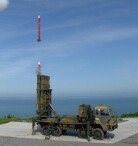Defending the Freedom of Korea, Even After Death
Defending the Freedom of Korea, Even After Death
Posted April. 24, 2005 23:48,
With the mellow notes of traditional Scottish bagpipes, a jar containing the remains of a dead British veteran was opened.
His comrades in arms scattered his remains off of a 350-meter height, and grey-haired veterans behind them raised their hands in salute, praying for the soul of their dead fellow soldier.
The winds scattered his remains to every corner of the Republic of Korea, a country he had defended.
On the evening of April 24, an event was held on Mt. Jungseong located in Gueup-ri, Jeokseong-myeon, Paju City, Gyeonggi Province to strew the remains of Scott Bainbridge, a Korean War veteran, who died in March last year at the age of 71.
For 14 months, from 1952 to 1953, he had engaged in fierce battles against the Chinese Peoples Volunteer Army around the Paju area. The heights of Mt. Jungseong, where his remains were thrown about, was the site where he had been hit by splinters of shell fired by Chinese forces.
His fellow soldiers said that, although the Chinese attacks had grown more intense by the day with the conclusion of a truce drawing near, the second class private Bainbridge never lost his coolness in fighting against the enemy.
In 2001, Bainbridge made his first visit to Korea since the end of the war. Deeply impressed by Koreas incredible development, he made a will that he wanted the remains of his dead self to be sprinkled in Korea.
In March last year, he died of heart attack on his way back home from a gathering of war veterans in Newcastle, UK. His remains, which had been preserved for about one year, were sent to Korea on April 17, accompanied by 80 other war veterans.
Starting at 11:00 a.m. on the same day, before strewing his remains, another event was held in front of the Monument for UK Military Participation in the Korean War, in Seolma-ri, Jeokseong-myeon, Paju-si, in commemoration of the British battalion which had guarded the heights for four days against tens of thousands of Chinese troops.
The event was attended by approximately 100 Korean War veterans from the Commonwealth of Nations, such as the United Kingdom, Canada and New Zealand, as well as about 100 family members of the participants and their dead fellow soldiers. Among other attendees were Warwick Morris, British Ambassador to Korea, and a 92-year-old war veteran, then-Sergeant Robert Harrington.
Around this time of the year, Korean War veterans from the Commonwealth of Nations make a visit to the Monument for the Participation of the British Commonwealth in the Korean War in Paju, Gapyeong, and other places, to revisit the spirit of those days.
In her commemorative remarks read by Ambassador Morris, Britains Queen Elizabeth II said, It is a very meaningful occasion that war veterans who participated in the Korean War to protect the freedom of Korea are visiting those hard-fought fields again. She also added that she would remember those war veterans forever with British citizens.
These Korean War veterans, on that day, also granted 250,000 won each in scholarship money to 72 students at middle and high schools around the Paju area, including Jeokseong Composite High School.
Nevertheless, there were only a few Korean participants in the days event, including Chairman Ji Gap-jong of the United Nations Korean War Allies Association, some executive members of the Korean Veterans Association, Gyeonggi Provincial Governor Sohn Hak-kyu and four generals from the UN Forces Command and local army divisions.
Dong-Young Lee argus@donga.com







